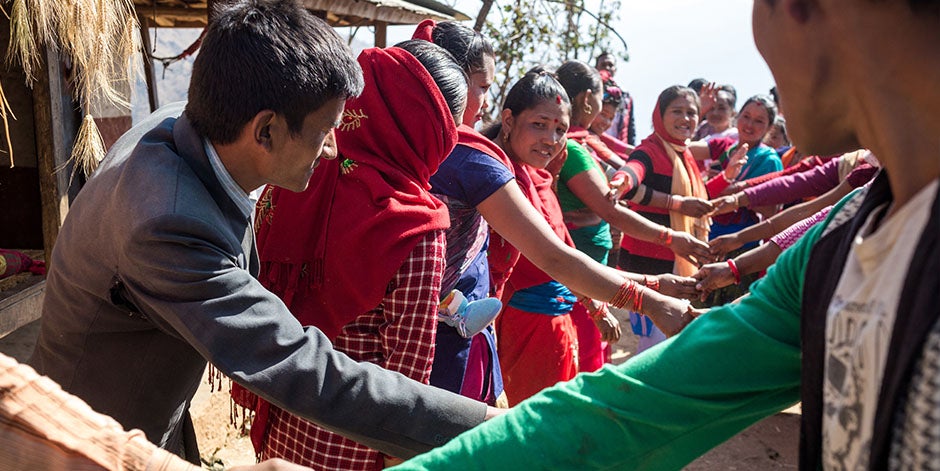FACT Project’s Pragati Solution

Participatory Community Games to Increase Fertility Awareness and Family Planning Use
Developed and tested as part of the FACT Project, Pragati is a social and behavioral intervention comprised of nine games implemented in five districts of Nepal (Bajura, Nuwakot, Pyuthan, Rupandehi, and Siraha). The games sparked challenging conversations in communities around fertility and family planning, side-effects of family planning methods, and social norms that drive birth timing and family size. As a research intervention, preliminary findings indicate that Pragati effectively increased fertility awareness and established an enabling environment for family planning use.
Grounded in formative research, Pragati was piloted over 15 months between 2017 and 2018 in marginalized communities. The Pragati games were implemented by community health volunteers and well-positioned women and men who facilitated topical discussion. At its core Pragati uses critical reflection questions that encourage participants to analyze existing assumptions about reproductive health topics through learning new information or experiences and to apply that information to their own lives.
The Pragati games were refined through robust proof of concept and pilot testing, have been adapted and scaled up to other settings in Nepal and other countries, and are now ready for further replication. The Pragati materials include: 1) a manual which highlights simple steps for organizing and facilitating the games in communities; 2) game materials with instructions and activity cards to use during implementation and facilitation; and 3) a resource packet including materials related to orientations, coaching of community health volunteers, and monitoring of planned activities.
Watch the Pragati micro-documentary. The video was filmed in the five districts of Nepal and highlights Pragati’s approach and community members’ experiences with the games.
Download the entire Pragati Manual English | Nepali
Chapter 1 - Fertility Awareness
This chapter expands on how our bodies and reproductive systems work. Games in this chapter explain the menstrual cycle and how the gender of a baby is determined.
Chapter 2 - Community Norms
The games included in this chapter encourage participants to discuss existing social and gender norms to help women and men understand issues and choices around family planning use.
- Chapter Card English | Nepali
- Hopscotch Game Instruction Card English | Nepali
- Hot Potato Game Instruction Card English | Nepali
- Agree/Disagree Game Instruction Card English | Nepali
- Agree/Disagree Game Cards English | Nepali
- Role Playing Game Instruction Card English | Nepali
- Role Playing Game Cards English | Nepali
Chapter 3 - Family Planning Methods
To help women and men make informed decisions about the number and timing of children, the game in this chapter provides key facts about various family planning methods (how often to use or replace a method, the duration of protection, and return to fertility).
Chapter 4 - Side Effects of Family Planning Methods
Side-effects being one of the reasons for discontinuing family planning methods, the games in this chapter inform participants on how to manage them and help distinguish between real side-effects and myths/rumors.
Resource List
Resources for Community Mobilization
- Guidance for male engagement English | Nepali
- Strategy for engaging influential people English | Nepali
Orientation Materials
- Promoter Orientation English | Nepali
- Provider Orientation English | Nepali
- Family Planning Fact Sheet English | Nepali
Materials for Supervision and Program Support
Watch the Pragati Games in Action
Curious about the Pragati games? We created this series of short videos to give programmers a quick look at how the five core games are played.
Explore the Pragati Blogs
- Do myths and misconceptions matter in Nepal?
- Reproductive Health: From Women’s Issue to Community Affair
- Challenging the norm in Nepal: the value of community critical reflection
- “We learned about sex from Google.”
- Sharing Reproductive Health Knowledge With a New Generation
- Game Changer: The Evolution of the Menstrual Cycle Game
- Managing Menstruation in Nepal: My personal story about deeply rooted social norms
- Menstrual norms in Nepal…. They are changing!
- Menstruation Norms: Where do we go from here?
 Where We Work
Where We Work  Press Room
Press Room  FACT Project
FACT Project  Passages Project
Passages Project  Learning Collaborative
Learning Collaborative  Search All Resources
Search All Resources  Social Norms
Social Norms  Fertility Awareness Methods
Fertility Awareness Methods